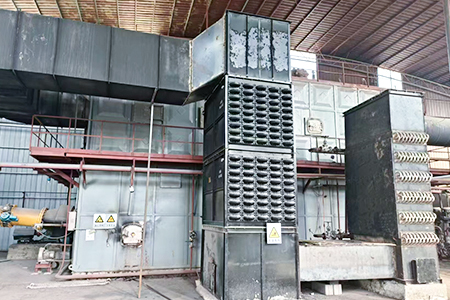R&D and manufacture of biomass gasification equipment, environmental protection equipment, boiler equipment, investment in heating (steam) energy operation and management.
Tel:+86 0769-82928980
E-mail:[email protected]
Web Menu
Product Search
Exit Menu
Industry News
Is the Biomass Gas Boiler the Future of Sustainable Heating Solutions?
As the world grapples with the urgent need to reduce carbon emissions and transition to renewable energy sources, biomass gas boilers have emerged as a promising solution for sustainable heating. These innovative systems convert organic materials like wood chips, agricultural waste, or pellets into combustible gases, which are then used to generate heat.
One of the most compelling features of biomass gas boilers is their reliance on renewable resources. Unlike fossil fuels such as coal, oil, or natural gas, which are finite and contribute significantly to greenhouse gas emissions, biomass gas boilers utilize organic materials that can be replenished through sustainable practices. This makes them an environmentally friendly alternative for heating homes, businesses, and industrial facilities.

For instance, in rural areas where access to traditional energy infrastructure may be limited, biomass gas boilers provide a practical and eco-conscious solution. Agricultural residues like corn stalks, rice husks, or sawdust—often considered waste products—can be repurposed as fuel, reducing landfill use and promoting circular economies. By harnessing these materials, biomass gas boilers not only minimize waste but also lower dependence on non-renewable energy sources.
Moreover, the combustion process in biomass gas boilers is designed to be cleaner than traditional wood-burning systems. Advanced technologies, such as gasification, convert solid biomass into syngas (a mixture of hydrogen, carbon monoxide, and methane), which burns more efficiently and produces fewer pollutants. This results in reduced particulate matter, sulfur dioxide, and nitrogen oxide emissions, aligning with global efforts to combat air pollution and climate change.
The environmental benefits extend beyond emission reductions. Biomass gas boilers support reforestation initiatives by encouraging the responsible harvesting and replanting of trees. When managed sustainably, this cycle ensures that forests continue to absorb CO2 while providing a steady supply of biomass fuel. This harmonious relationship between energy production and ecological preservation underscores the potential of biomass gas boilers as a cornerstone of green energy strategies.
Cost-Effectiveness and Energy Independence
Another standout feature of biomass gas boilers is their cost-effectiveness and ability to promote energy independence. For many households and businesses, heating costs represent a significant portion of monthly expenses. Biomass gas boilers offer a competitive alternative to conventional heating systems, particularly in regions where biomass fuel is locally sourced and abundant.
For example, in agricultural communities, farmers can utilize crop residues or animal manure as feedstock for biomass gas boilers, effectively turning waste into wealth. This not only reduces heating costs but also creates additional revenue streams by selling excess fuel or heat to neighboring properties. Similarly, industries that generate large amounts of organic waste—such as food processing plants or breweries—can integrate biomass gas boilers into their operations, achieving both waste management and energy generation goals simultaneously.
Energy independence is another key advantage. By relying on locally available biomass resources, users can reduce their dependence on imported fossil fuels, which are subject to price volatility and geopolitical uncertainties. This localized approach strengthens regional economies, fosters job creation in the bioenergy sector, and enhances resilience against energy crises.
Furthermore, government incentives and subsidies often make biomass gas boilers an attractive investment. Many countries offer tax credits, grants, or feed-in tariffs to encourage the adoption of renewable energy technologies. These financial incentives, combined with long-term savings on fuel costs, make biomass gas boilers a smart choice for forward-thinking consumers and businesses.
Addressing Challenges and Future Innovations
Despite their many advantages, biomass gas boilers face certain challenges. For example, the initial installation cost can be higher compared to traditional boilers, potentially deterring some users. However, ongoing advancements in technology are addressing this issue by improving efficiency and lowering manufacturing costs. Modular designs and scalable systems are also being developed to cater to diverse needs, from small residential units to large industrial installations.
Looking ahead, innovations in automation and smart controls promise to revolutionize biomass gas boilers. Real-time monitoring systems could optimize fuel consumption and performance, ensuring maximum efficiency and minimal maintenance. Additionally, research into advanced gasification techniques and hybrid systems that combine biomass with solar or geothermal energy could further enhance their versatility and sustainability.
Quick Links
Products
contact Us
 Tel: +86 0769-82928980
Tel: +86 0769-82928980 Fax: [email protected]
Fax: [email protected] E-mail: [email protected]
E-mail: [email protected] Company Address: Dalang Chamber of Commerce Building, No. 288 Yinlang South Road, Dalang Town, Dongguan City 13333, China
Company Address: Dalang Chamber of Commerce Building, No. 288 Yinlang South Road, Dalang Town, Dongguan City 13333, China Factory Add:
West side of Centre Road and south side of Zhongyuan Road within Hongcaoyuan, Hongcao Town, Shanwei Urban District
Factory Add:
West side of Centre Road and south side of Zhongyuan Road within Hongcaoyuan, Hongcao Town, Shanwei Urban District
Copyright© 2022 Guangdong Bao Jie Technology Co., Ltd.All Rights Reserved.


 EN
EN 





